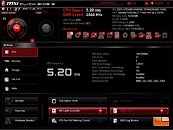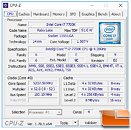Monday, January 16th 2017

MSI Z270 Motherboards Automate Core i7-7700K Overclock to 5.20 GHz
The "Game Boost" overclock automation feature the UEFI setup program of MSI Z270 motherboards, apparently is successful in overclocking Core i7-7700K processors to 5.20 GHz with liquid CPU cooling. Most motherboard vendors include some degree of automated overclocking with their motherboards, which let overclocking novices squeeze a little bit of extra performance out of their CPU and memory without having to tinker with settings they know nothing about. These technologies use automated trial-and-error overclocking and stability testing over multiple reboots, to achieve a somewhat high overclock setting that takes system stability and temperatures into account.
The highest automated overclock setting of MSI "Game Boost" within its UEFI setup program of the company's Z270 XPower Gaming Titanium motherboard is having success in getting the CPU to run at 5.20 GHz. The program presents the user with 11 grades of overclock. At its highest grade, the program pushes the CPU all the way to 5.20 GHz, with 52x 100 MHz multiplier/base-clock setting, a vCore voltage of 1.507V, vDIMM of 1.2V, and disabled C-states. Keeping this overclock stable, however, took AIO liquid CPU cooling.
Source:
LegitReviews
The highest automated overclock setting of MSI "Game Boost" within its UEFI setup program of the company's Z270 XPower Gaming Titanium motherboard is having success in getting the CPU to run at 5.20 GHz. The program presents the user with 11 grades of overclock. At its highest grade, the program pushes the CPU all the way to 5.20 GHz, with 52x 100 MHz multiplier/base-clock setting, a vCore voltage of 1.507V, vDIMM of 1.2V, and disabled C-states. Keeping this overclock stable, however, took AIO liquid CPU cooling.


57 Comments on MSI Z270 Motherboards Automate Core i7-7700K Overclock to 5.20 GHz
Now, I wouldn't run it like that, but intel.intel . spec is 1.52V max. I've run chips at intel max for years...now, this isn't penryn/45nm, but it's going to last longer than a year with the appropriate cooling and board. ;)lol, not anything decent with 2x120mm radiator...
(Cooler Master Seidon 240M, Corsair H100i, Enermax Liqtech 240, NZXT Kraken X60, Silverstone Tundra TD02, Thermaltake Water 3.0 Extreme) shows similar performance to D14 and nobody could beat D14 in noise/ perfomance ratio. Newer tested coolers such as H105, H110i GTX or Silverstone TD02-E won't changed situation
I had a friend's Nehalem i7 that could reach 4ghz (maintaining 24/7) at a higher voltage but as time goes by, the CPU could no longer reach that speed without crashing, very possible due to electromigration damage.
I noticed these KABY Lake (even some skylake) need a high voltage to overclock at and beyond 5GHz. My own 7700k need 1.38 Voltage @ 5Ghz. But this 1.5+ Vcore is intense. Wish these tiny chips had larger die size like Extreme Edition ones for sake of thermal contact.
And then all of a sudden it wouldn't boot at all with that chip, no matter the voltage and settings (even stock).
The same is now starting to creep up with my current Sandy Bridge E 6-core, which I have clocked to 4.8GHz on all cores for ~5 years now. It started about a year ago, where the chip suddenly demanded a slightly higher vCore of 1.4v (was 1.38v for ~4 years prime-stable and all). I'm now at 1.42v using the exact same overclock.
This Sandy Bridge E system probably lasted longer because I implemented an offset overclock opposed to the 990x, where the CPU varies its voltage from ~0.85v while sitting idle on the Windows desktop up to 1.42v when doing actual work. This also keeps energy bills, heat and noise in check.
All that is with a hugely oversized watercooling setup (4*480 rads, 2 pumps, everything watercooled), so no temperature issues whatsoever.
Being that said, I would say sure, hard overclocking does have an impact on component life. The question is, if the system should last you longer than the reduced lifetime of your CPU due to overclocking or if you have any problems with switching CPUs if that is happening to you sooner.
In my case I'm fine with it and the performance gain justifies it for me personally.
Back to the topic: I'd be interested in the power draw of this CPU at those voltages. My system draws ~300W more compared to idle only when I start number crunchers such as prime (no GPU, just CPU, VRM and RAM). I only could imagine how crazy this would be at 1.5v... oO
Needs to be a very good AIO though. :)
I don't believe those Intel processors should be pushed above 1.4 (really, I don't even like beyond 1.3 much for 24/7).
For example MSI boards, Z270, set SA and IO voltage when using XMP to a sky high 1.45 and 1.4V. To run 3866 I only need 1.25 and 1.2V respectively.
1.3/1.4V is nothing... I would happily rock 1.4V all day long until the thing died years later... seriously.
As far as 1.4, its just a personal preference. I don't see 1.35 being horrible, just a little bit more for my taste but I know its not going to end its life in the next year from that.
img.techpowerup.org/170108/capture003-20170108.jpg
tRC 30 1866
img.techpowerup.org/170109/capture005-20170108.jpg
This a Turbo Core setting or across all Cores?
PS check my voltage and max temps lol
You know, oc'ing once started with litres of coffee in the middle of the night testing, and now this auto program comes around just booting up to 1.5V in an Intel CPU like it's nothing, lol.
That CPU will proberly have serious stability issues with 1 to 2 years.
Seems to me these 5GHz @1.5V suffer pretty badly from diminishing returns.
I also remember a friend having a phenom X6 on a MSI board try to auto OC, and it overvolted both the CPU and the chipset. No surprise, it was dead a year and a half later.
What are the tolerances of the transistors in these CPU's?
100% scam marketing as usual. Bad MSI, bad.